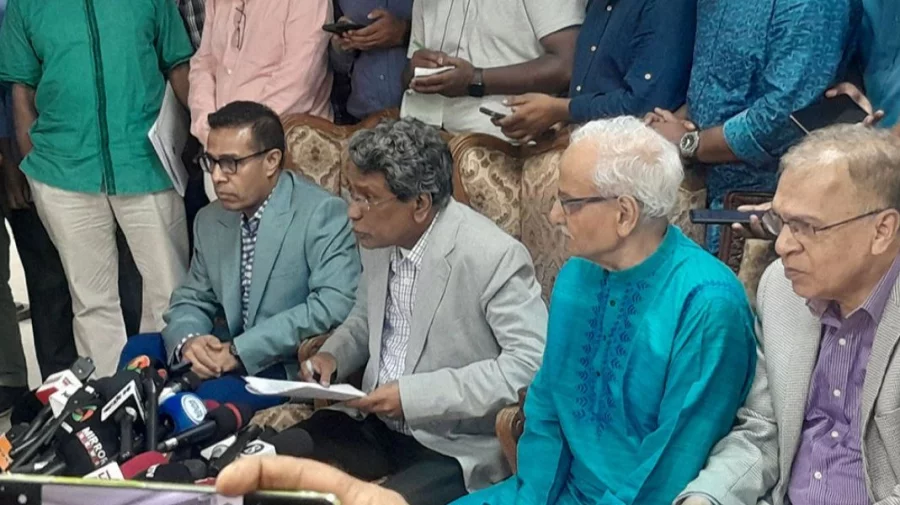
27 parties in favor of maximum 10-year prime ministership, 3 parties including BNP against
 Three parties including BNP have voted against the National Consensus Commission's proposal to limit the term of a person as Prime Minister to a maximum of 10 years. And the remaining 27 parties including Jamaat-e-Islami, Jatiya Nagorik Party-NCP have voted in favor of the proposal. Yesterday, Sunday, from 11:30 am to 5 pm, the Consensus Commission held a meeting with political parties at the Foreign Service Academy in Dhaka. After the fifth day of the second phase of the dialogue, Consensus Commission Vice Chairman Ali Riaz and leaders of various political parties appeared before reporters. Ali Riaz told reporters, after long discussions, we have come to a clear place. A person cannot remain as Prime Minister for more than 10 years. After coming to such a place, we have not yet reached a consensus. After the discussions, the three parties expressed their differences and said that they would reconsider the issue. They said that they would talk to their party's policy-making level and discuss it again. They believe that other issues are related to this issue, especially the formation of the National Constitutional Council-NCC and how the upper house of parliament will be formed. They will present the issue during the discussion on those related issues.
Three parties including BNP have voted against the National Consensus Commission's proposal to limit the term of a person as Prime Minister to a maximum of 10 years. And the remaining 27 parties including Jamaat-e-Islami, Jatiya Nagorik Party-NCP have voted in favor of the proposal. Yesterday, Sunday, from 11:30 am to 5 pm, the Consensus Commission held a meeting with political parties at the Foreign Service Academy in Dhaka. After the fifth day of the second phase of the dialogue, Consensus Commission Vice Chairman Ali Riaz and leaders of various political parties appeared before reporters. Ali Riaz told reporters, after long discussions, we have come to a clear place. A person cannot remain as Prime Minister for more than 10 years. After coming to such a place, we have not yet reached a consensus. After the discussions, the three parties expressed their differences and said that they would reconsider the issue. They said that they would talk to their party's policy-making level and discuss it again. They believe that other issues are related to this issue, especially the formation of the National Constitutional Council-NCC and how the upper house of parliament will be formed. They will present the issue during the discussion on those related issues.
The three parties that opposed the idea are BNP, National Democratic Movement (NDM) and Bangladesh Liberal Democratic Party (BLDP). BNP Standing Committee Member Salahuddin Ahmed said that although most parties including Jamaat and NCP agree on the 10-year term of the Prime Minister, three parties including BNP disagree. He said, we have reiterated what was in the written proposal and our 31-point written proposal. No person can serve more than two consecutive terms as Prime Minister. There have always been different explanations about the term here. Some have proposed it twice. In the case of the term, the explanation is that if a person is the Prime Minister for one term, then someone else becomes the Prime Minister for three months. The majority party made someone else the Prime Minister. Then maybe the previous one became the Prime Minister. Then he could not fulfill his two more terms. No one can become the Prime Minister for two, three or five times in a year. The explanation about the times is not sufficient for the agreed reasons.
The BNP leader said, the issue we talked about in terms of tenure is that generally the term of parliament is five years. Whether the parliament will remain in power for five years depends on the parliament. Our constitution mentions that parliament will be in power for five years. Whether it is three or four terms, if I can mention the maximum number of years, a person can be the Prime Minister for so many years in his lifetime, I did not mention any specific year. I do not have the power to decide on that matter on my party's behalf alone. If a decision is made in the meeting regarding the term, then I will have to discuss it in my party forum.
Jamaat Naib Ameer Syed Abdullah Mohammad Taher said, by two-term government we mean a full-term premiership. Accordingly, 10 years is two full terms. More than one prime minister has been seen in the same parliamentary term. Especially in the case of the UK. Our main objective is to limit power and ensure the stability of the country.
NCP Senior Joint Member Secretary Tasneem Zara said, there was a consensus on the Prime Minister's term that the term of the Prime Minister needs to be limited. The current system we have needs to be changed. There was a discussion about two terms or two terms, another proposal was that it might be better to determine the maximum number of years a person can be the Prime Minister in his lifetime. After the discussion, many came to a place that a maximum of 10 years can be the Prime Minister. The proposal from the NCP was that a person can take oath as the Prime Minister twice. If for the sake of consensus, everyone talks about 10 years, then the NCP will be flexible in determining the time. She said, later the discussion came that if the term of the Prime Minister has to be limited, then along with the formation of the Upper House on a proportional system, the NCC and all these things should also be discussed. Otherwise, the power of the Prime Minister will be greatly reduced. In this case, our position is that we would like no institution like the Election Commission to behave in a biased manner in the appointment of NCC or constitutional posts.
Meanwhile, the meeting has been postponed for two days at the request of the political parties, said Ali Riaz, vice-chairman of the Consensus Commission. Representatives of 30 political parties participated in the meeting of the Consensus Commission. On this day, the commission held discussions with the political parties on the Prime Minister, the basic principles of the state and the determination of constituencies. The vice-chairman of the Consensus Commission said that some issues, including the formation of the upper house and the presidential election process, discussed at the beginning of the meeting, remain unresolved. He called on the political parties to make concessions to reach an agreement on the unresolved issues with a view to preparing the July Charter.
© All rights reserved shaplatelevision © 2020 -2025